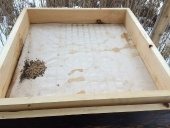




~all knowledge is worth having~








"Limitation is the mother of good management", Michael Evanari
Location: Southwestern Oregon (Jackson County), Zone 7




~all knowledge is worth having~




Yes, I'm that David The Good. My books are here: http://amzn.to/2kYcCKp. My daily site is here http://www.thesurvivalgardener.com and my awesome videos are here https://www.youtube.com/subscription_center?add_user=davidthegood




Terri Matthews wrote:I have decided that the books are full of it. I have decided to check my bees once a month from now on.
I can read on other beekeeping forums that people can tell when the bees are coming in full of nectar, they can tell by looking at the bees coming and going if they are queenless, yadda yadda. I cannot! To me they look like bees!
I am going to open the darned hive every month, and if it is cold out I want to open it every warm snap. Because I really hate spring surprises.
find religion! church
kiva! hyvä! iloinen! pikkumaatila
get stung! beehives
be hospitable! host-a-hive
be antisocial! facespace





Amy Leonard wrote:
I have lost all my hives again this year and I don't know what to do about this invader. Over the last 5 years I have successfully harvested honey 1 time, and the bees survived that following winter and came roaring back in the spring, then petered out in the fall and by the following year I have to replace the colony again with new queen and bee kit. Other years there were other catastrophes - like a month of nights less than 20 and no rain. I am in Nor Cal (zone 7) and that is not typical - all the bees froze/starved/died - and the moth has struck before, but I don't catch it in time. What would that look like? has anyone else battles this bug on behalf of our other bugs?
find religion! church
kiva! hyvä! iloinen! pikkumaatila
get stung! beehives
be hospitable! host-a-hive
be antisocial! facespace









find religion! church
kiva! hyvä! iloinen! pikkumaatila
get stung! beehives
be hospitable! host-a-hive
be antisocial! facespace




~all knowledge is worth having~




Amy Leonard wrote:thankyou to all who have replied! This community is awesome and i am reassured that my bees were not eaten by mothra, but the moth took advantage of an existing issue. If I could summon godzilla I doubt he would do my bidding as a hive guard. Is anyone familar with bees and california buckeye not getting along?
.

|
What a stench! Central nervous system shutting down. Save yourself tiny ad!
Switching from electric heat to a rocket mass heater reduces your carbon footprint as much as parking 7 cars
http://woodheat.net
|

